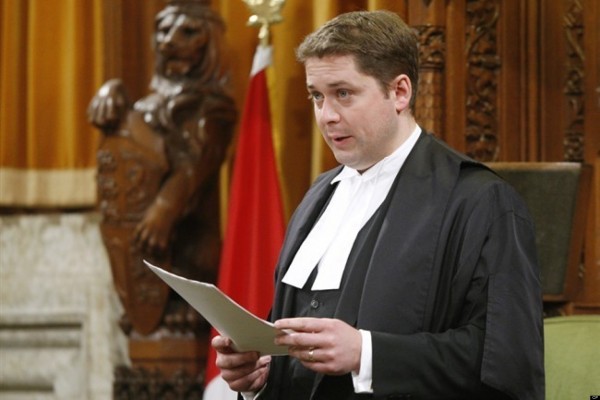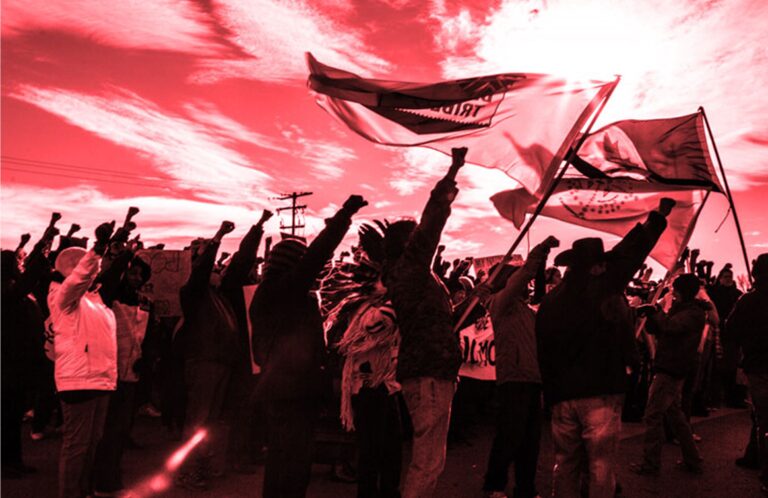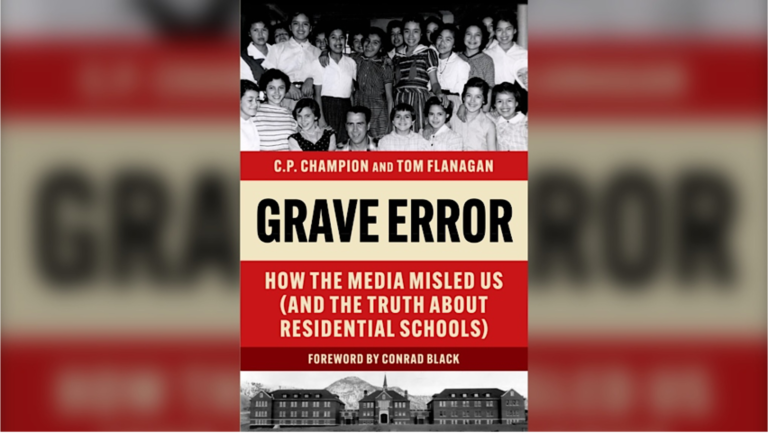During the 1992 Charlottetown constitutional referendum, I was a senior staffer in the Prime Minister’s Office of Brian Mulroney. Despite overt support from across the political spectrum, business, and media, 55 percent of the country voted ‘no’. A few days later, some of the PMO staff held a party, more of a wake, actually. Buttons were handed out with the sardonic slogan: “The Elites Want In”.
The black humour was aimed at the populist Reform Party and its leader, Preston Manning, who had led the No side in the campaign. The following year Mulroney was gone and his party was reduced to two seats in the House of Commons. It’s hard not to recall all this in the wake of the repudiation of the elites in last week’s Brexit referendum. Could the divisions now engulfing British politics reoccur in Canada’s Conservative Party? They did before and just might again.
Unease about Europe is a very British tradition, and it runs deepest in the Conservative party. Margaret Thatcher was forced to resign in large part because of her unyielding anti-Europe reflex. Her successor John Major was forced to contest a mid-term leadership challenge to quell dissenting Eurosceptic MPs. He won, but the antagonism towards him and Europe lingered on, helping ruin four successive Conservative leaders.
Prime Minister David Cameron’s decision to resign was inevitable after leading the Remain side to defeat. He had called the referendum in another attempt to tame the Tory Eurosceptics. An ‘in or out’ vote on Europe, he promised. As it turned out, slightly more anti-establishment ‘outs’ voted Leave than establishment ‘ins’ voted Remain. It was a very British ‘Up yours!’ and it left Cameron’s country and his party badly divided.
The resulting chaos and confusion were entirely predictable given the conduct of the campaign. ‘Project Fear’ was the label given to the Remain campaign over its assertions of economic doom and gloom. The Leavers, meanwhile, resorted to wild exaggerations of Brexit benefits.
Britain now faces a brutal morning after. Lame duck PM Cameron heads a divided government that has to negotiate an EU exit it didn’t want. Opposition leader Jeremy Corbyn faces a leadership mutiny amongst his Labour colleagues. The British Pound has plummeted in value. British sovereign debt has been downgraded. Scotland and Northern Ireland are less united in the kingdom today than last week.
The Leave campaign in Canada
Yet, four senior Conservative MPs in Canada – one declared and three potential leadership candidates – have expressed their delight or at least satisfaction with the Brexit result. Jason Kenney congratulated Britons for choosing “hope over fear”; Tony Clement called it a “magnificent exercise in democracy”. Andrew Scheer, a former House of Commons Speaker, wrote in an pre-vote op-ed that “the supremacy of Parliament…is increasingly being replaced by the dictates of EU bureaucrats in Brussels,”; while Maxime Bernier stated that British voters “…decided to stand up against big government and reclaim their freedom from it.”

Last year, all had run for re-election on a Conservative Party platform of free trade, open markets, financial discipline, and economic stability. Brexit is the exact opposite. In government, the Conservatives embarked upon a series of free trade deals around the world including the massive Canada-European Trade Agreement with the EU. If they had remained in power, a Brexit decision in the midst of those discussions would have been seen as disruptive and unhelpful. It is almost impossible to imagine a Harper government wanting anything but a Remain vote.
So, what’s changed?
Let’s start by comparing voting bases. The Leave campaign found strong support amongst Britons upset over immigration, migration, and refugee claims. These were strongest in older, rural and traditional England, less so in the cities, Scotland, and amongst younger Britons. If there is a parallel, it would be in where the Conservative Party currently finds its own support: rural, smaller town Canada, regionalized mostly in Western Canada, and with older Canadians.
The contrast between Kenney’s previous openness to new Canadians as Immigration minister and an underlying animosity animating many Leave voters is sharp. It bears more resemblance to the 2015 election’s niqab debate and the “barbaric cultural practices” snitch line then championed by another leadership candidate, Kellie Leitch (as yet unpronounced on Brexit). These “anti-immigrant” positions were widely condemned during and after the campaign (including within the party) as contributing to defeat. Yet, now Kenney and others are tacitly endorsing the xenophobic messages of Leave advocates like UK Independence Party leader Nigel Farage, contrary to their previous openness to immigration.
Does this signal nativist divisions still lurking within Canada’s Conservatives?
They existed before. The Reform Party nourished anti-Quebec attitudes from time to time. Who can forget their 1997 campaign ad of “No More Quebec Prime Ministers” featuring a circle and line through the faces of each of the other party leaders, all from Quebec?
Or, is it a resurgent nationalism instead?
“Take Back Control” was the slogan of the Leave campaign. Nationalism, not nativism, was the underlying disposition. British governments and citizens had long chafed at the supra-nationalism of the European Union’s governance structures. Here was a chance to stand up against the elites.
Anti-elitism is not new to Canadian conservatism. Its strongest expression has been found in populist movements emanating from the Prairies, first under John Diefenbaker and later under the Reform Party. “The West Wants In”, went the Reform slogan. It matured under Stephen Harper.
Harper’s government made a high art of populist conservatism. From cutting the GST, to boutique tax cuts for targeted voter groups, to the sell-off of swank Canadian embassy properties abroad, to direct government intervention in markets such as wireless and telecommunications on behalf of consumers, it seemed conservative principles often took a back seat to populist tactics. And an anti-elites bias found expression in reluctant climate change policy, the muzzling of government scientists, and elimination of the long-form census.
The Harper era also saw Ottawa’s control within the federation scaled back further than it had been in decades. The federal government had its role and the provinces theirs. It would give them money – more money than ever, in fact – but was resolute in avoiding initiatives that required institutionalized federal government engagement. Anything that smacked of a ‘national’ policy was verboten. Climate change, a national energy strategy, and health care innovation, for example, were all outside the foul lines of this new (Conservatives would argue, traditional) brand of federalism.
This was devolutionary more than revolutionary. It was in keeping with conservative biases against interventionist central governments. Calls for ‘sovereignty’ by Brexit Leavers are echoed in this traditional Canadian conservative canon.
The very process of Brexit – via popular referendum – also has appeal to conservatives and Conservatives. It has appeared for the past two decades in federal and provincial party platforms when it comes to tax increases, secession, and more recently, electoral system change. It is seen as a check on big, arbitrary government. It projects ultimate sovereignty with ‘the people’ over government. How could you not cheer the British people triumphing over the elites and establishment?
A related anti-establishment impulse animated foreign policy under the Harper Conservatives. They visited regular disdain upon not just international institutions like the United Nations, but on internationalism itself. From unconditional support for Israel to unequivocal condemnation of Islamist terrorism, Conservative self-styled “principled foreign policy” was a robust delineation of good and bad, black and white, clear and opaque. Nuanced geopolitical diplomacy it was not.
Out of power and return to form
Conservatives have long seen themselves as a minority presence and, by extension, a minority party in Canadian political life. In fact, they are. Too intermittent in government to become the establishment and too animated by government’s existence to abide it, conservatives find themselves with an often-atavistic distaste for the very institutions they are elected to run. It is the classic outsider view.
Now in opposition, it is perhaps unsurprising that some Conservatives are reverting to this archetype. But it is not inconsequential. Many thought the uneasy alliance Stephen Harper forged in victory was between the pragmatists and the social conservatives. Economic conservatism of lower taxes combined with smaller government and tougher criminal sentencing was attractive enough to still other divisive arguments in the conservative family over abortion and same-sex marriage. Plus Harper’s unforgiving political persona subordinated dissent in favour of election-winning discipline.
His defeat and departure eliminated those checks and balances. A renewed social conservatism debate immediately bubbled forth at the party’s recent Vancouver conference over a resolution on recognizing same-sex marriage. Progressives, if you will, prevailed. The party appears ready to turn the page on that debate, minority views notwithstanding.
But as the Conservatives close one old debate they appear to be opening another. Brexit may be unleashing equally divisive tribal challenges – this time over the role of the nation-state and democratic institutions in a time of supra-internationalism and globalization.
British voters’ decision to quit the European Union can fairly be seen as a profound failure of political elites to seek public accommodation for this internationalist project. The Conservative government of David Cameron and the U.K.’s Labour opposition both failed to sustain what progressives might call a “social licence” for continued membership in the EU. Political elites across Europe are finding it increasingly difficult to convince their polities that it is in their interest to arrogate power to an external governing authority, in this case Brussels.
The United Kingdom is united mostly in name today. England voted Leave. Scotland voted Remain. Wales voted Leave. Northern Ireland voted Remain. Older Britons voted Leave, younger voted Remain. London voted Remain. The countryside voted Leave.
Brexit has released terrific centrifugal forces not yet contained or channeled.
Is this what some Canadian Conservatives are celebrating? They would say no. Their argument was with bigger, controlling government as represented by the European Union. It was a chance of victory for the ‘little guy’ against the elites, and traditional, older expression of national sovereignty.
At its most essential, this notion of ‘popular sovereignty’ seems to be behind this Conservative Brexit response. But this phrase is freighted with meaning and, by extension, misinterpretation. It is not a long fall from nationalism to nativism, as evidenced in Britain, Europe, and the Donald Trump presidential campaign in the U.S. It implies a rejection of internationalism and multilateralism or at least some of its contemporary institutions and processes. And it appears strangely at odds with past Conservative free trade ambitions, not to mention the record numbers of immigrants who came to Canada when the party was in power.
Brexit has paradoxically brought out old impulses and new thinking for the Conservative Party of Canada. In the Republican Party, there are isolationist and internationalist wings. Will we see the same here?
As the Conservative party rebuilds and contemplates new leadership, these concepts are being given new meaning.
~
David McLaughlin is a former chief of staff to Brian Mulroney, Jim Flaherty, and Bernard Lord. He was campaign manager for Brian Pallister and the P.C. Party of Manitoba in the 2016 election.




